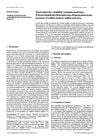 57 citations,
November 2017 in “Nature Communications”
57 citations,
November 2017 in “Nature Communications” Researchers found 71 genetic regions linked to male pattern baldness, which account for 38% of its genetic risk.
50 citations,
May 2018 in “International journal of cardiology” Testosterone is linked to cardiovascular risk factors and stroke, but its exact role is unclear.
 47 citations,
March 2016 in “Journal of dermatology”
47 citations,
March 2016 in “Journal of dermatology” Understanding the genetics of rare inherited ichthyosis syndromes is key for better treatments and genetic counseling.
[object Object]  43 citations,
November 2018 in “Nature Communications”
43 citations,
November 2018 in “Nature Communications” Genetic variations affecting skin structure play a key role in severe acne.
 41 citations,
November 2011 in “The Journal of Dermatology”
41 citations,
November 2011 in “The Journal of Dermatology” Some hair loss disorders are caused by genetic mutations affecting hair growth.
 40 citations,
December 2012 in “Epilepsia”
40 citations,
December 2012 in “Epilepsia” Neurosteroids change how GABA_A receptors work in the brain, which could be important for treating temporal lobe epilepsy.
 36 citations,
July 2014 in “Experimental Dermatology”
36 citations,
July 2014 in “Experimental Dermatology” Skin and hair can regenerate after injury due to changes in gene activity, with potential links to how cancer spreads. Future research should focus on how new hair follicles form and the processes that trigger their creation.
 34 citations,
April 2014 in “Psychopharmacology”
34 citations,
April 2014 in “Psychopharmacology” Stress and alcohol affect brain chemicals differently in rats, mice, and humans, influenced by genetic differences.
 31 citations,
January 2010 in “GenomeBiology.com (London. Print)”
31 citations,
January 2010 in “GenomeBiology.com (London. Print)” The research concluded that selection significantly shaped the genetic variation of the X chromosome, with certain regions affected by past selective events.
 30 citations,
June 2019 in “Frontiers in Endocrinology”
30 citations,
June 2019 in “Frontiers in Endocrinology” The document concludes that managing non-classical congenital adrenal hyperplasia in females requires personalized treatment, genetic counseling, and a team of specialists.
 29 citations,
November 2022 in “Nature Medicine”
29 citations,
November 2022 in “Nature Medicine” Genetic variations greatly affect individual metabolism and can impact health and disease risk.
 29 citations,
March 2019 in “British Journal of Dermatology”
29 citations,
March 2019 in “British Journal of Dermatology” Acne is significantly influenced by genetics, and understanding its genetic basis could lead to better, targeted treatments.
 27 citations,
June 2019 in “Aesthetic Plastic Surgery”
27 citations,
June 2019 in “Aesthetic Plastic Surgery” Platelet-Rich Plasma (PRP) treatment may increase hair growth for genetic hair loss, but more research is needed to confirm this.
[object Object]  26 citations,
June 2012 in “The Journal of Obstetrics and Gynecology of India”
26 citations,
June 2012 in “The Journal of Obstetrics and Gynecology of India” Most skin changes during pregnancy are harmless and temporary, but some can risk the fetus and need careful treatment.
 24 citations,
October 2014 in “Cold Spring Harbor Perspectives in Medicine”
24 citations,
October 2014 in “Cold Spring Harbor Perspectives in Medicine” Genetic research has advanced our understanding of skin diseases, but complex conditions require an integrative approach for deeper insight.
24 citations,
January 2018 in “Indian Journal of Dermatology, Venereology and Leprology” Androgenetic alopecia is mainly caused by genetic factors and increased androgen activity, leading to hair follicle miniaturization.
 23 citations,
November 2001 in “Archives of Dermatology”
23 citations,
November 2001 in “Archives of Dermatology” Genetic discoveries are key for understanding, diagnosing, and treating inherited hair and nail disorders.
23 citations,
October 1996 in “Dermatologic clinics” Genes affect cytokine production, which can influence chronic diseases, and certain interventions may help prevent related molecular damage.
 21 citations,
October 2011 in “PloS one”
21 citations,
October 2011 in “PloS one” Certain molecules in hair change with age and could be used for cosmetic treatments.
 19 citations,
January 2015 in “Indian Journal of Dermatology”
19 citations,
January 2015 in “Indian Journal of Dermatology” Skin changes in women with PCOS are mainly due to hormonal imbalances.
 17 citations,
June 2017 in “Gene”
17 citations,
June 2017 in “Gene” A rare genetic mutation found in an Indian family can be detected through prenatal screening.
 16 citations,
March 2019 in “Experimental dermatology”
16 citations,
March 2019 in “Experimental dermatology” Injury changes how hair follicle stem cells behave, depending on the hair growth stage.
 15 citations,
January 1987 in “Electrophoresis”
15 citations,
January 1987 in “Electrophoresis” Human head hair proteins can be typed into eight distinct patterns, useful for genetic and forensic investigations.
 12 citations,
January 2015 in “Indian Journal of Dermatology, Venereology and Leprology”
12 citations,
January 2015 in “Indian Journal of Dermatology, Venereology and Leprology” A mother and daughter with similar hair loss conditions and identical HLA types suggest a genetic link between the conditions.
 12 citations,
October 1995 in “The Journal of Clinical Endocrinology & Metabolism”
12 citations,
October 1995 in “The Journal of Clinical Endocrinology & Metabolism” Skin changes can indicate hormonal imbalances and help diagnose endocrine disorders.
 11 citations,
March 2013 in “Gene”
11 citations,
March 2013 in “Gene” A certain genetic variation in the IL1A gene may lower the risk of a hair loss condition in Chinese people.
 11 citations,
January 2013 in “Postępy Dermatologii i Alergologii”
11 citations,
January 2013 in “Postępy Dermatologii i Alergologii” The conclusion is that a combination of noninvasive treatments and lifestyle changes can improve skin health during menopause.
 10 citations,
March 2019 in “Human Genetics”
10 citations,
March 2019 in “Human Genetics” A genetic mutation in the SGK3 gene causes hairlessness in Scottish Deerhounds and may relate to human hair loss.
 10 citations,
October 2008 in “Andrologia”
10 citations,
October 2008 in “Andrologia” Finasteride changes antioxidant enzyme expression, possibly affecting sperm protection in rats.
 10 citations,
June 2011 in “Movement Disorders”
10 citations,
June 2011 in “Movement Disorders” THAP1 gene changes do not affect DYT1 dystonia; finasteride may help reduce tics and OCD in Tourette syndrome.



























